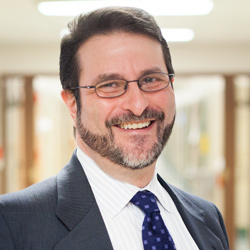Water Sustainability is Focus of New Research Center
Water sustains all life on the planet, but the limited natural resource -- stretched and stressed by climate change, economic development and global population growth -- now is one of the world’s most critical challenges.
To catalyze research and education on complex water issues, Northwestern University has established the interdisciplinary Northwestern Center for Water Research. Northwestern also is contributing to a larger initiative called “Current,” launched today by Chicago Mayor Rahm Emanuel, to make the Chicago region a water hub for economic and technological innovation. (Current was announced at the White House Water Summit March 22.)
“The Current public-private partnership will make Northwestern’s Water Center even stronger,” center director Aaron Packman said. “Working with strong industrial, governmental and community partners will help us achieve our goal of developing global solutions for regional problems.”
 Northwestern is one of the founding partners of Current, which represents the Chicago region’s water industry, the fourth largest in the nation. Development of both the Northwestern Water Center and Current has been linked since the beginning, Packman said.
Northwestern is one of the founding partners of Current, which represents the Chicago region’s water industry, the fourth largest in the nation. Development of both the Northwestern Water Center and Current has been linked since the beginning, Packman said.
The Northwestern Center for Water Research will integrate research efforts across the University and focus on long-term solutions to ensure water security and sustainability, both regionally and globally. Outside collaborations with research institutions and conservation organizations as well as educational initiatives and public outreach events will be critical to the center’s success.
“We have a tremendous capability at Northwestern to solve diverse problems related to the global water crisis as well as to advance Chicago’s water economy through technological innovation,” Packman said. “Water sustainability and security touch every area of Northwestern, including science, engineering, law and medicine, and I know people are eager to be involved. The center will bring experts together to contribute to solutions through science, technology and policy.”
Packman is a professor of civil and environmental engineering in Northwestern’s McCormick School of Engineering and Applied Science.
Northwestern faculty, postdoctoral fellows and students from a variety of disciplines will be involved in innovative work at the Northwestern Center for Water Research. The center and its research community will work to achieve:
- Fundamental advances in water science enabling new water technologies and improved prediction of water systems.
- High-performance discovery, design and commercialization of materials for water monitoring and processing technologies.
- Efficient, robust and durable solutions for water reuse, low-purity water sources and resource recovery from wastewaters.
- Integration of theory, data and models to predict large-scale, long-term outcomes in complex water/energy/food/ecosystems and enable safe, efficient and sustainable management of water.
“Northwestern is distinguished by its diverse high-impact discovery,” said Jay Walsh, vice president for research. “Our new water research center is perfectly aligned with the University’s strengths and aspirations.”
To facilitate collaborations both at Northwestern and elsewhere, the center has partnered with the Institute for Sustainability and Energy at Northwestern (ISEN), Northwestern-Argonne Institute of Science and Engineering (NAISE) and Northwestern Pritzker School of Law’s Environmental Advocacy Center. Important outside partners include Argonne National Laboratory and conservation organizations such as The Nature Conservancy and the Chicago Botanic Garden.
Initial educational efforts and events to engage students, the Northwestern community and the general public include:
- A new special topics course, “Water in Israel and the Middle East,” offered in the spring quarter for both undergraduate and graduate students in the humanities, natural sciences and engineering. It will be co-taught by Packman and Elie Rekhess of the Crown Family Center for Jewish and Israel Studies.
- Working with student service organizations related to water, such as Engineers for a Sustainable World and Engineers Without Borders.
- A One Book One Northwestern seminar May 10: “Forced to Abandon Our Fields: The 1914 Pima Indian Interviews As the Context of the Arizona Water Settlements Act of 2004.”
- A half-day public international symposium May 18: “Water in Israel and the Middle East: Geopolitical Conflicts, Technological Challenges and Sustainable Solutions,” co-organized by the Water Center and the Crown Family Center for Jewish and Israel Studies.
- A session on “Materials for Water Sustainability” at the second Northwestern University-Tel Aviv University Workshop titled “Energy, Sustainability and Biomaterials,” co-organized by Professor David Seidman (Northwestern) and Professor Noam Eliaz (Tel Aviv University), which will be held Sept. 20 to 22 at Northwestern.
“Water is a vital natural resource whose importance is highlighted by global geopolitical and environmental complexities,” Walsh said. “Northwestern’s water research will play a critical role in advancing research and educating the next generation of scientists in interdisciplinary areas of water security and related challenges -- locally, regionally, nationally and internationally.”